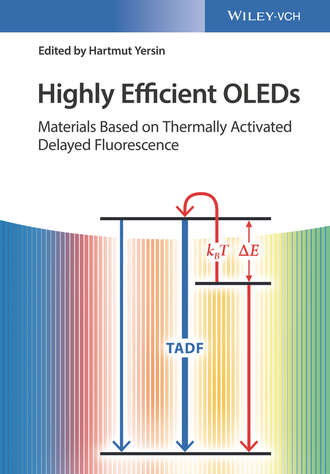
Полная версия
Highly Efficient OLEDs. Materials Based on Thermally Activated Delayed Fluorescence
The essential resource that offers a comprehensive understanding of OLED optimizations Highly Efficient OLEDs. Materials Based on Thermally Activated Delayed Fluorescence (TADF) offers substantial information on the working principle of OLEDs and on new types of emitting materials (organic and inorganic). As the authors explain, OLEDs that use the Singlet-Harvesting mechanism based on the molecular property of TADF work according to a new exciton harvesting principle. Thus, low-cost emitter materials, such as Cu(I) or Ag(I) complexes as well as metal-free organic molecules, have the potential to replace high-cost rare metal complexes being currently applied in OLED technology. With contributions from an international panel of experts on the topic, the text shows how the application of new TADF materials allow for the development of efficient OLED displays and lighting systems. This new mechanism is the gateway to the third-generation of luminescent materials. This important resource: Offers a state-of-the-art compilation of the latest results in the dynamically developing field of OLED materials Is edited by a pioneer in the field of OLED material technology Contains a detailed application-oriented guide to new low-cost materials for displays and lighting Puts the focus on the emerging fields of OLED technology Written for materials scientists, solid state chemists, solid state physicists, and electronics engineers, Highly Efficient OLEDs. Materials Based on Thermally Activated Delayed Fluorescence offers a comprehensive resource to the latest advances of OLEDs based on new TADF materials.


